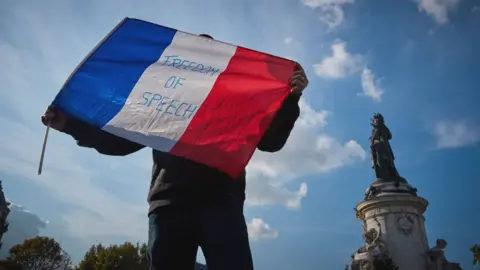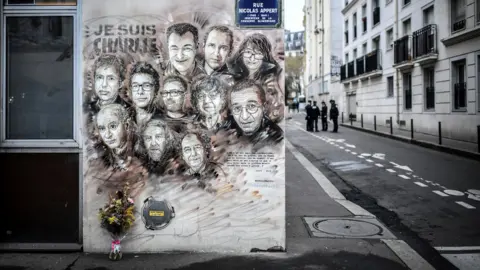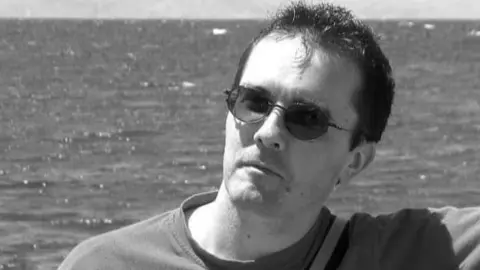Samuel Paty: Beheading of teacher deepens divisions over France's secular identity
 Getty Images
Getty ImagesThere was something hidden by the crowds that gathered across France over the weekend.
The dramatic show of national unity - after the decapitation of teacher Samuel Paty outside Paris - hid growing dissent in some parts of the country over the nation's view of secularism and freedom of speech.
"Last year, a student told me that it was completely legitimate to kill someone who failed to show respect to the Prophet [Muhammad]," Fathia Agad-Boudjhalat, a history teacher, told French radio. "It comes from what they hear in their families."
Fathia has used cartoons of the Prophet Muhammad for years, along with cartoons of Donald Trump and Emmanuel Macron, to teach about freedom of speech.
But many in her profession report worrying trends among a minority of students who seem at odds with French laws and values.
State secularism - or laïcité - is central to France's national identity. It's as important as the concepts of "liberty, equality, fraternity" that make up its post-Revolutionary motto.
Laïcité decrees that the public space - whether classrooms, workplaces or ministries - should be free of religion. Curbing freedom of expression to protect the feelings of one particular community, the state says, undermines the country's unity.
But there is evidence that a growing number of people in France are uncomfortable with this argument and want the boundaries around secularism and free speech to change.
According to Michaël Prazan, a former teacher, this dissent began to grow in the early 2000s when the government banned religious symbols in schools.
Back then, he was teaching in a suburb of Paris with a high Muslim population. He believes teachers have failed to react to a growing chasm between them and some of their students.
"We need to be more responsive as soon as there is a student who poses a problem in class, such as rejoicing in a terrorist act," he told me. "We need to deal with it quickly before it spills over onto the internet and a death threat for the teacher."
Teachers say they noticed a change after 2015, when Islamist gunmen attacked the satirical magazine Charlie Hebdo after it published cartoons of the Prophet Muhammad.
"They deserved it," some students told philosophy teacher Alexandra Girat, "because the cartoons were too much - they shouldn't represent the Prophet [Muhammad] that way."
 Getty Images
Getty ImagesPolls suggest wider public opinion in France has hardened since the attacks, with a majority of people now supporting the magazine's decision to publish the cartoons. Previously, most said it was an "unnecessary provocation".
Meanwhile, almost 70% of Muslim respondents believe publishing the images was wrong.
But both sample groups strongly condemned the attacks themselves.
The roots of deepening divisions over religious identity and freedom of speech are complex. They include the influence of conflicts overseas and the racism and social marginalisation experienced by many descendants of Muslim immigrants here.
France's national values are hard to defend, some say, if they don't appear to apply to you.
So where does all that leave teachers like Samuel Paty, who are tasked with teaching students about freedom of speech?
 AFP
AFPOne woman at Sunday's rally said France's leaders needed to act.
"We can't leave teachers alone to face these complicated religious, moral and philosophical questions," she told us. "They need direction."
We've been sounding the alarm for years," Iannis Roder, a historian and teacher, told French radio. "I hope this is a turning point in recognising the reality of what happens on the ground."
President Macron has reportedly asked the government to come up with "concrete action" and to strengthen security in schools, promising that "fear will change sides".
More than 80 people who posted online messages of support for Mr Paty's killer will be investigated by police, and associations with radical links are under fresh scrutiny too.
The government is under pressure, with one senior opposition figure criticising Mr Macron's approach and calling for "armes et non des larmes" - weapons not tears.
But after so many attacks here over the past five years, the divisions - and the disillusion - seem to grow a little more each time.
How pupils will react to the killing of Mr Paty won't be clear until early November, when schools return after a two week break leading up to the Christian holiday of Toussaint.
After the attacks in 2015, some children refused to take part in a minute's silence that was held across the nation to remember those who died.
A similar national moment is planned for Mr Paty when schools return next month. Once again, teachers will be watching to see what the response of their pupils will be.
